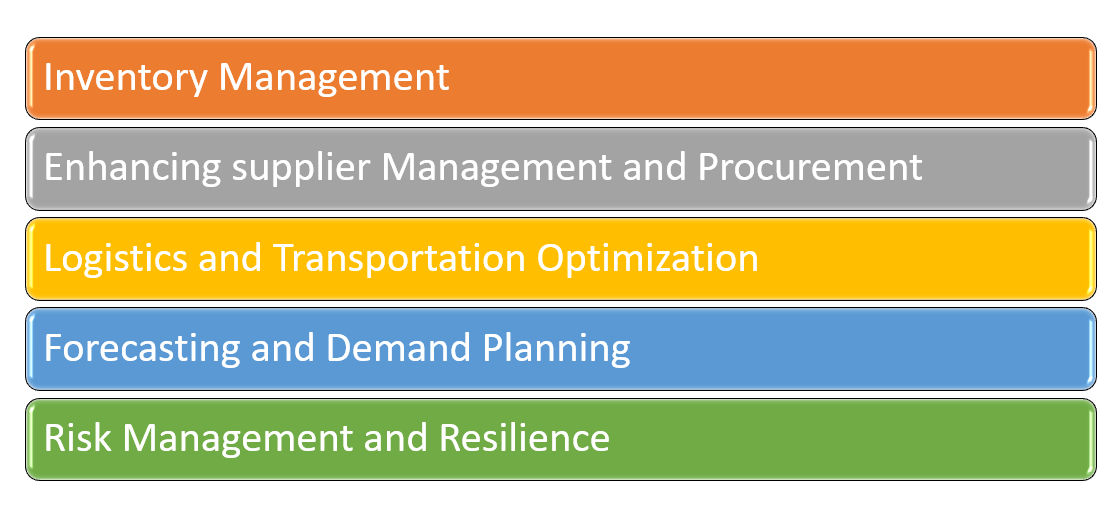How to Nail your next Technical Interview











You may be missing out on a 66.5% salary hike*













Interview Kickstart has enabled over 3500 engineers to uplevel.
Introduction of IT owing to its exceptional advancements, the CAGR of the Supply Chain Big Data Analytics Market is expected to witness growth up to 17.31% by 2028. With the fastest growing markets in Asia Pacific and the largest market in North America, there lies massive opportunities for individuals associated with the field. Before heading into strategic planning, an insight into supply chain management and the role of Data Science is critical to understand. After all, it is among the prime deriving factors of intriguing CAGR reported above. Go on to read.
Here’s what we’ll cover:
Supply chain management refers to handling the pathway of the formation of a product. It begins with handling raw materials and ends with efficient manufacturing of the furnished product. Apart from this, it is critically associated with the coordination and integration of all activities involved in
The supply chain is an important part of any business due to its ability to influence customer service, operating costs, and financial management. Supply chain management consists of the following elements:
Optimization is a critical element of supply chain management with the power to enhance the efficiency and performance of the overall process. It leverages the data and the potential of data analytics to perform the said. Here’s how optimization influences the supply chain management:
Changing market scenarios, demands, consumer preferences, and supply chain disruptions require constant adaptation to new needs and for thriving. Data science fulfills the demand for agility through research, organization, and pattern identification. It helps to remain competitive regardless of changes in requirements.
The complex supply chain processes require real-time instant updates to fulfill urgent and important requirements. Eliminating siloes is crucial to increase insights into the problems and to find opportunities for improvement.
Market preference for ethical and environment-friendly suppliers is high. To meet the expectations, transparency in all the processes will be super helpful. Businesses can increase sustainability by performing required modifications such as adopting or increasing ethical labor practices and automating functions, among other strategies.

Data Science has the potential to transform industries. Supply chain management is not different. Let us understand how it optimizes the process:
Data science offers effective tools for evaluating and optimizing inventory information. Businesses can utilize the tools for real-time data analysis, inventory modeling, and simulation. These further contribute to efficient data-driven decisions for problems concerning demand fluctuation, replenishment strategies, and predictive maintenance.
Suppliers are the root of the supply chain. Businesses can manage suppliers and their supplies by analyzing the performance and flow of raw materials, registering and monitoring the quality of products to identify the quality, and making decisions as per the requirements. Data science incorporates performance indicators, predictive analytics, and supplier scorecards to reduce risks, increase cost savings, and choose the best supplier based on the demand.
Unexpected disruptions and challenges in planning routes are unavoidable components of logistics and transportation. Optimizing them for increased efficiency requires an updated technological presence in the business. Data science provides in-depth insights and research into selecting optimal delivery routes with minimal traffic and shortest distance.
Meeting unexpected high volumes without prior notice is challenging. Similarly, handling perishable items in times of fluctuating markets is riskworthy. Predictive analytics from data science helps in forecasting and demand planning. It utilizes market trends, historical sales data, and external factors to provide predictions with enhanced accuracy.
Natural disasters, supply disruptions, and geopolitical events are among the common categories of risk to businesses and supplies. Data science provides the basis for developing risk mitigation strategies while also contributing to data-driven decision-making. Scenario analysis, predictive modeling, statistical analysis, simulation, and multiple other advanced techniques contribute to making businesses resilient.

The tools and techniques relevant to data science supply chain management are:
The future is bright with expectations of overcoming the challenges and incorporating more advanced and automated equipment. The integrated Internet of Things (IoT) devices with equipment, vehicles, and inventory tend to contribute to proactive decision-making. Advanced analytical features and usage of blockchain technology will enhance transparency, trust, and traceability. In the coming times, we can also expect more active businesses that can easily meet the demands during pandemics or other natural disasters.
The data scientist role is widely available in multiple industries and their sectors, including supply chain management. Possession of the required skills and knowledge to apply the concepts is going to help the candidates in the long run in their careers. The aspirants with clarity in concepts and developed portfolios, however, can often end up missing the chances at their dream companies.
Coming to your rescue, Interview Kickstart houses experienced and efficient FAANG recruiters cum mentors. Playing the dual role, they are well-versed in helping the candidates crack the interviews at any company. Do you aim high enough to witness the change in you? Register for our webinar for free for more insights into our offerings.
The warehouse, master product, demand, logistics, financial, external, production, external, and inventory data are the various sources of data required in supply chain optimization.
Big data analytics provides data and insights for enhanced coordination and synchronization of production schedules. It facilitates collaboration among various stakeholders in the supply chain while also optimizing the inventory levels.
Companies like Tesco, Merceded-Benz Research and Development India Private Limited, Aptus Data Labs, Emerson, Ford Motor Company, Koch Global Services, Air India, and others hire data scientists for supply chain management.
Candidates require at least a Bachelor’s degree in engineering/computer science/mathematics/statistics or other quantitative fields. Experience and being well-versed in data science, Machine Learning, and AI concepts are necessary, along with domain knowledge. Further, familiarity with supply chain, manufacturing, warehousing, distribution, and logistics domains is a must.
ARIMA for demand forecasting, Sklearn for clustering, Hugging face transformers for NLP, PyTorch, OpenCV, and TensorFlow for computer vision or image classification, Ray for building chatbots, and Floium or NetworkX for data visualization are among the best libraries and frameworks for supply chain management.
Data analysis skills, mathematical competence, communication skills, organizational abilities, understanding of market dynamics and economics, and teamwork techniques are critical to becoming a supply chain analyst.
Lack of skilled workforce efficiency in technology, cost and time consumption on integrating the technology, challenge to data security, and ethical considerations are some of the factors hampering the speed of data science integration with supply chain management.
Attend our webinar on
"How to nail your next tech interview" and learn
.png)






